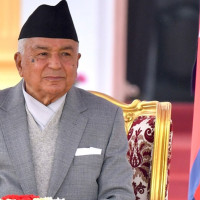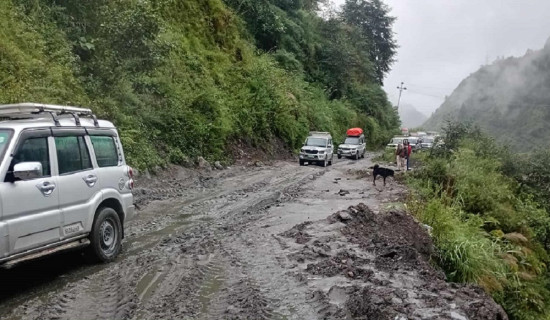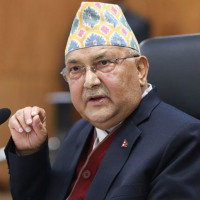- Friday, 30 January 2026
Nepal makes big stride in poverty reduction: UNDP
By A Staff Reporter
Kathmandu, Oct. 18: Nepal has registered an impressive achievement in reducing poverty substantially in the second decade of the 21st century. Its incidence of poverty was reduced to 17.5 per cent of the total population in 2019 from 39.1 per cent in 2011, the Global Multidimensional Poverty Report 2022 reported.
According to a report released jointly by the United Nations Development Programme (UNDP) and Oxford Poverty and Human Development Initiative (OPHI) at the University of Oxford on Monday, the Multidimensional Poverty Index (MPI) value of Nepal fell from 0.185 in 2011 to 0.111 in 2016 and ultimately 0.075 in 2019.
The report noted that this progress has been accompanied by notable improvements in sanitation, which saw the largest reduction in the percentage of people deprived in this indicator—from 34.1 per cent to 6.6 percent among poor people and from 60.6 per cent to 21.4 per cent among the whole population. This progress has got a special mention in the report along with Ethiopia and Lao People’s Democratic Republic.
“Nepal’s investment in sanitation has improved access to drinking water, child nutrition and child mortality through a reduction in diarrhoea. In India, some 415 million people left multidimensional poverty in a 15-year period - a historic change,” read the report. Improvements in sanitation are highly correlated with improvements in other health indicators, such as child nutrition, child mortality and access to drinking water.
“A growing body of evidence points to the positive health benefits of having access to an improved sanitation facility and drinking water on child health and wellbeing through lower diarrhoeal incidence, a leading cause of child mortality in developing countries,” read the report.
According to it, the recent progress in reducing deprivations in sanitation and drinking water might have driven the improvement in children’s nutrition and the decrease in childhood mortality in Nepal, contributing to the recent decline in MPI value.
Speaking with journalists on Monday evening in Kathmandu, UNDP’s Resident Representative for Nepal, Ayshanie Medagangoda-Labé, suggested that Nepal should continue to invest in poverty reduction programme. However, she maintained that the scattered poverty could pose a challenge to such efforts.
However, the most common deprivation profile in Nepal in 2019 is one where people are deprived in years of schooling, cooking fuel, housing and assets. Nearly one in 10 poor people in the country experiences this profile. An integrated, high-impact policy response might include a housing package that considers energy concerns and home improvement grants, paired with targeted lifelong learning programmes among poor households, the report mentioned.
The report has identified a series of ‘deprivation bundles’-recurring patterns of poverty- that commonly impact those who live in multidimensional poverty across the world. According to it, the data are used to identify the different poverty profiles that are more common in certain places. This is a crucial step in designing strategies that address multiple aspects of poverty at the same time.
The report found that more than 50 per cent of poor people (593 million) lack both electricity and clean cooking fuel, almost 40 per cent of poor people (437 million) lack access to both drinking water and sanitation, and more than 30 per cent of them (374 million) are deprived of nutrition, cooking fuel, sanitation and housing at the same time.
The MPI also offers an in-depth analysis of poverty across regions.
The majority of multidimensionally poor people (83 per cent) live in Sub-Saharan Africa (nearly 579 million) and South Asia (385 million). Two-thirds of poor people live in middle-income countries, and 83 per cent in the rural areas. And despite its impressive pre-pandemic progress, India was still home to 229 million poor people. Nigeria had the next highest number, with 97 million poor people.




-square-thumb.jpg)











